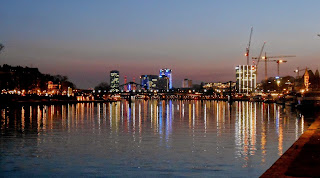La vie d'une autre (another woman's life)
France/Belgium 2012
review
Marie, played by Juliette Binoche, wakes up one morning and is horrified to discover that she is middle-aged. Last thing she can remember is being 25 and falling in love and into bed with Paul (Mathieu Kassovitz). Look at it this way, and it’s what happens to many people, even if most wake up middle-aged in somewhat less affluent circumstances than Marie. It used to be called mid-life crisis. And if we think very hard, we may still remember how all these years went by, whereas Marie can’t, due to either amnesia or time-travel (see also Camille redouble for a voyage in the opposite direction), take your pick.
In Sylvie Testud’s adaptation of a novel by Frédérique Deghelt, this time-jump is just a device to heighten the challenge of turning around a relationship that must have decayed gradually over 15 years, as for Marie these 15 years are shrunk into one night. Predictable confusion about everyday routines and complex emotions ensues – you’re not allowed to smoke in a restaurant? When did that happen? – but I think that for everybody on the wrong side of 30 the more interesting aspect is to examine whether there is a little bit of Marie’s predicament in our own lives.
Sometimes, I could swear that the 17-year-old in my household went to primary school just last week, but fortunately, I’m not quite as confused and bewildered (yet) as the protagonist of the film. Some aspects of international affairs have this 15-year gap for me – for instance, I have no idea how, after the dissolution of the Soviet Union, Russia ended up handing out its public property to a small club of people we now call the Russian billionaires as if they had always existed. I surely missed the memo when those billions changed hands.
Speaking of which, in this time of scandalous increases in economic inequality, it is a bit unfortunate that Testud expects us to feel for people who appear to be obscenely rich by anybody’s standards, but as the film dates from 2011, she probably didn’t quite see this problem coming. Otherwise, I found it quite enjoyable and thought-provoking. (And of course it didn't get released in the UK, that's why I'm reviewing it in my series of Films Not Shown)




















